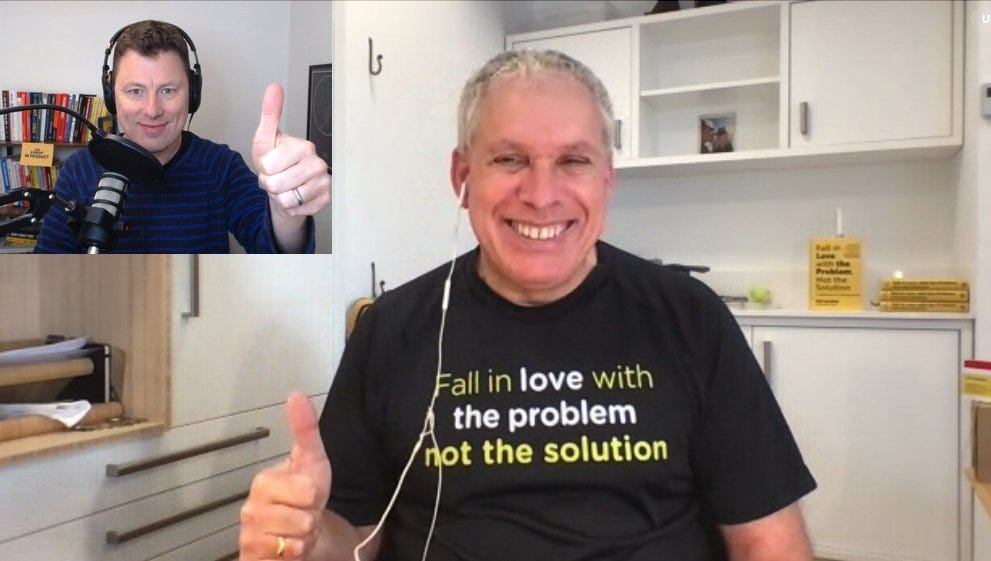I was recently told, apparently with a straight face:
"If a company gets a direct request from a customer, that is not on the backlog or on an ideas pool backlog, it means that the product team is weak and not doing their job as good [sic] as they could."
I was confused by this statement, and also fundamentally disagreed with it, so I asked Twitter what they thought. They had the same opinion as me, by a large margin (93.7% disagreed with the statement).
Now, on the one hand, the statement is obviously preposterous. On the other hand, maybe I can see what the person was trying to say. We’re all aware of “sell it forward” salespeople who sell features you don’t have, or big customers demanding niche functionality that only works for them. One of my (possibly naive) hopes is that we can reduce that behaviour through robust discovery, finding out what people really want, and building it before they ask for it. This makes any random requests just that… random, which can be discarded or serve as precursors for additional discovery.
But, I in no way expect random customer requests to go away any time soon. There’s always something! And it’s absolutely not a reflection of the quality of a team that people ask for those somethings.
A word from My Mentor Path
I’m passionate about mentoring and, in 2022, mentored 76 product managers and product leaders. I’ve benefited from mentoring in the past, and I genuinely believe it to be an essential part of the support network that helps people navigate their careers and understand what’s OK and what’s not.
However, I realised that I could not scale to mentor all the people I’d like to, so I co-founded My Mentor Path, a free mentoring platform that allows mentors and mentees to connect and help each other flourish. If you want in, come on over and sign up as a mentor, a mentee, or both.
New podcast episode: Valentine's Special! A Love Letter to Problems, not Solutions
When I heard that Uri Levine wanted a chat, I was immediately interested. Uri has founded two unicorns, Waze (sold to Google) and Moovit (sold to Intel). With two billion dollar exits to his name, Uri is busy working on his third, but he’s also a passionate teacher and has recently released a new book: Fall in Love with the Problem, not the Solution. We spoke about some of the themes from the book, and why running a startup is like falling in love. Check the episode out here or find it on your favourite podcast app.
If you're afraid to fail then, in reality, you already failed
When you're building something no one has built before, you never know if it'll work. You need to experiment, fail fast and have multiple shots on goal. The faster you fail, the sooner you can have another shot.
Some other content stuff recently:
I joined Ryan Frederick on his podcast to talk about how sales teams and product management teams can work together.
My good friend Adam Thomas and I spoke on YouTube about product strategy (I also put this out as a podcast episode recently)
I gave a talk at a conference for GfK, a company I worked at for 19 years! It was great to go back and I may well try to craft it into a general talk. Here are some takeaways.
Who SHOULDN’T Product Management report through?
I recently ran a poll on Twitter as I’ve spoken to a few people unhappy at how product management is treated in their company and I wanted to see what other people thought. The premise of the poll was simple… which C-suite member would you least like the product management team to report to?
The results are in and there’s clearly no love for the poor old CMO!
Now, it’s fair to say that most people’s judgement is going to be clouded here. Clouded by That One Exec™ that railroaded everything through and never listened to anybody. We have to bear that in mind when trying to interpret these results. There are many excellent execs out there across all functions, and we should celebrate them!
But! I do have some thoughts.
In an ideal world, it shouldn’t matter
If you’re operating in a well-functioning company, with good product practices, a culture of trust and a leadership team that believes in (more or less) empowering their teams then you could report to the CFO for all I care. We have to realise that executive leaders are supposed to necessarily take a more holistic view of the organisation, and not just concentrate on their own area of most competence. A good CTO cares about more than just how well stuff is coded.
But in the real world, it does
But, we’ve all worked for executive leaders that feel anything but holistic. Many of us have worked for CTOs that are all tech, all the time. Some of us have worked for sales-y CEOs who seem to care for nothing but making the next quarter’s numbers. This is especially relevant if people have come from industry backgrounds, with a service mentality and no real experience in building products or product companies. That’s not to diminish their experience or skillset and, lest we forget, it’s likely these people have way more at stake in the company than most. But, it is apparent in their daily decision-making and it does have an effect on how products get made.
Who product management reports through is a statement
In an ideal world, whoever you report through doesn’t matter because they trust you to do your job. In the real world, the person you report through can have an outsized impact on how product management is run within the organisation, and what success looks like. There may be good reasons for product management to report through a non-standard reporting line, and I’m not saying it’s a red flag if this is so, but it’s definitely worth asking a question about it in an interview process.
So, let’s have some fun with those poll results and invent some caricatures, and think about some of the behaviours we might expect to drive some of those votes.
Why it sucks to report to the CMO
Because the CMO has a traditional marketing background, all about brand and events. They don’t really “get” product marketing, let alone product management, and they’re really just desperate to have something to give to the content marketer for the next LinkedIn post. They push to get flashy, but ultimately useless features onto the roadmap with a hard deadline of some conference or other. They refuse to talk about tech debt because they can’t market it.
Why it sucks to report to the COO
Because everything’s about processes and trying to make things efficient. They want a dozen dashboards to prove that the engineering team are “on track” and want to measure engineer utilisation per Jira epic. Oh, and by the way, only approved people can change Jira. They dislike experimentation because everything has to be a sure thing (otherwise we’re wasting time and effort) and they’re very keen on customer special projects because they’re chargeable.
Why it sucks to report to the CTO
Because they only care about what can be built, not why (or whether) it should be built. They have no real understanding of the business value of the product management team, or even of talking directly to customers. The product management team will spend all its time talking to developers and having arguments over technical debt and shadow roadmaps.
Why it sucks to report to the CEO
Because they’re still the de facto head of product and won’t allow the product management team to do their job. They’re desperate to still be seen as the visionary, and every single idea that they have will immediately fall directly onto the product management team, who have very limited ability to push back. They will constantly complain that the teams aren’t delivering as fast as they used to, whilst generally stymieing any efforts to help the teams do that.
Are CPOs the answer?
I’m a strong believer in product management teams having direct C-level representation, and having someone at the top table who can stand on a roughly equal footing with the rest of the C-suite. Happily, this is becoming more common! There are a couple of watch-outs though
Some business leaders prefer industry experts or “business” people to take the CPO role. These people need to know what they don’t know and defer to the product management practitioners at least some of the time.
or, alternatively…
Senior product managers get the chance at the top table and fumble it because they struggle to connect with the C-suite. These people need coaching, training and support to thrive.
Final thoughts
Ultimately, so much of this depends on the qualities of the person that product management reports through. As per the “business” CPO, it’s quite possible for a product management team to thrive under any leader as long as that leader is humble, knows what they don’t know, respects people’s expertise, and maintains an open mind.
If you enjoyed this newsletter, please share it with your friends! And please do let me know if there are any topics you’d like me to cover in a future issue.
Writing this newsletter is fun, and I love to give stuff away for free. But, if you want to buy me a coffee, you can always buy me a coffee.





Currently, in my company, it is a freakin' mess. Our group reports up through the COO, and that is ... sub optimal.
But there is another set of product management (don't ask) that reports to the CTO.
From what I know I think we have it better, slightly. But they both have huge drawbacks